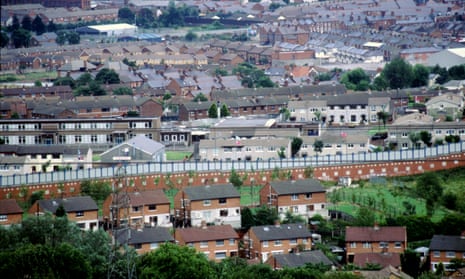Never far beneath the surface of day to day life, the undercurrent of Northern Ireland’s troubled past remains strong and has, once again, manifested itself in the issue of housing allocation.
Catholic families living in a shared neighbourhood in Belfast, designed to create mixed communities, have recently been told that due to threats of violence, they are no longer welcome and must leave the area. The Northern Ireland Housing Executive has confirmed that four families have already moved.
Housing allocation in Northern Ireland remains a complex and sensitive issue. The housing executive’s shared futures housing programme, is designed to include no more than 70% of people of any one religion. Five of 10 planned shared neighbourhood schemes have been completed. But the attempt to transcend segregation through shared schemes, apart from facing sectarian violence, could also end up maintaining high levels of housing allocation inequality that already exist.
In an area where housing has been fraught for 40 years, conflict between loyalists and nationalists can arguably be traced back to a civil rights march in 1968, protesting against the allocation of housing to a single Protestant woman ahead of Catholic families. Four decades on, 90% of social housing continues to be segregated into single identity communities.
And despite the Good Friday agreement’s aims to ensure that one religious group isn’t favoured over another in the region, Catholics are still experiencing extensive housing need [pdf].
There are now more peace walls – which separate communities at contentious religious interfaces – than there were before the Belfast agreement, but it is not the visible walls that are causing most concern.
Coupled with peace has been an aggressive economic neoliberalism – peace was good for business. Belfast, with its new cultural and business quarters, boutique hotels and shopping centres has been rebranded as “open for business”, attracting significant foreign investment. Religious divisions have remained; but the gap between rich and poor has increased. Other than London and Aberdeen there are more multimillionaires in Belfast [pdf] than anywhere else in the UK. But despite great wealth in the city, 80% of the most deprived communities are Catholic.
There is no doubt that shared schemes will be symbolic and important. People living in shared communities have described the positive impact of watching their children grow up in a more tolerant environment. However, the existence of mixed communities alone does not answer the difficult, structural questions posed by the legacy of the troubles, including how to deal with the high levels of social and economic deprivation in areas that were impacted most by the conflict. Organisations like the Participation and Practice of Rights, which support the principle of mixed communities, are concerned that the scheme might be put forward as an alternative to housing based on need – running counter to equality principles in the Good Friday agreement.
The troubles left a brutal legacy of continued segregation by religion and, more worryingly, recurrent religious discrimination. Perhaps the most worrying legacy is the invisible wall of economic inequality, marking out territories between communities, which although geographically near, are economically worlds apart. Shared communities will not resolve this.
Of course we should continue to build shared neighbourhoods. The crucial issue now, of segregation based on economic inequality, can be solved only when sectarian forces relinquish their control in dictating the geography of the city and put forward a needs-based policy that transcends religious divides.
Sign up for your free Guardian Housing network newsletter with comment and sector views sent direct to you on the last Friday of the month. Follow us: @GuardianHousing
Looking for a housing job, or need to recruit housing staff? Take a look at Guardian Jobs.

Comments (…)
Sign in or create your Guardian account to join the discussion